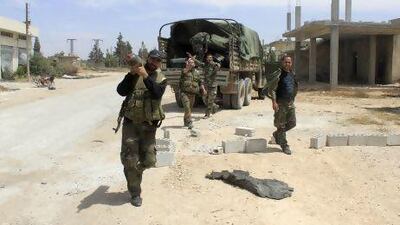Gaziantep, Turkey // The United Nations yesterday launched an unprecedented US$5.2 billion appeal for humanitarian relief in Syria, as aid workers warned the crisis was rapidly growing beyond their ability to cope.
At an international conference in Geneva, the UN said its previous estimate of $3bn (Dh11bn) to fund operations until the end of the year was no longer enough.
The new figure, a record-breaking appeal for the UN, is more than double the previous high of $2.2bn, made in 2003 for Iraq.
"We are witnessing not only the dramatic suffering of a people, but the progressive collapse of a state and the physical destruction of a country, with an increasing impact in the region," said Antonio Guterres, the UN High Commissioner for Refugees.
"If the fighting doesn't stop, we risk an explosion in the Middle East for which the international community is not prepared."
The money will pay for food, which accounts for 20 per cent of the total, plus clean water, medical facilities and supplies, schools and refugee camps.
Most of the funds are for refugees in neighbouring countries, mainly Jordan, Lebanon and Turkey, with $1.4bn for inside Syria.
"The scale of this crisis is completely incredible, it's like nothing I've ever seen before," said a veteran aid worker involved in NGO operations for Syrians. She has seen decades of emergency operations, including wars and drought in Africa and the Balkans.
"These numbers are apocalyptic," she said. "There are so many people in need that providing for them just burns through cash.
"Despite all the generous funding so far it hasn't been nearly enough. With the scale of this, $1bn is peanuts. This is a perfect storm."
Launching its funding appeal, the UN said it expected 3.5 million Syrians will have fled their country by the end of the year, more than double the 1.6 million already living as external refugees.
Inside Syria, millions more have been displaced from homes or require help meeting basic needs.
The UN predicts 10.25 million Syrians - half its pre-war population of 20.8 million - will need aid by the start of next year.
Access to food and clean water is becoming a growing concern, aid agencies have warned, as are spreading health problems, including outbreaks of hepatitis, typhoid, cholera and dysentery.
"People are probably already dying from lack of food and proper drinking water, and the diseases that entails- it's just that we're not seeing them or counting them yet," the aid worker said.
"This is going to get worse: farmers have not been planting crops, crops have not been harvested, people have run out of food they had stored up. Already people are living on flour and tea in some places."
More than 94,000 people are believed to have been killed since the first protesters took to the streets in March 2011.
What began as a peaceful uprising, violently suppressed by the autocratic regime of the president, Bashar Al Assad, has since grown into a regional and international conflict marked by appalling atrocities and deepening sectarianism.
Speaking at the appeal launch, Valerie Amos, the UN's top humanitarian official, said the vast numbers belied a "humanitarian tragedy".
"It's estimated that two years of conflict have set back Syria's development by two decades," Ms Amos said.
Fighting continued yesterday with clashes in villages near Qusayr, recently taken over by regime forces. Rebels said they were close to victory at the Minagh airbase in Aleppo.
Also yesterday, Austria announced it was withdrawing its soldiers from their peacekeeping mission in the Golan Heights demilitarised zone, on the Syria-Israel frontier, a day after rebels briefly took over the border post and regime forces shelled it.
Russia's president Vladimir Putin, a major ally and arms supplier to Mr Al Assad, offered to send in Russian troops to fill the peacekeeping role if asked by the UN.

